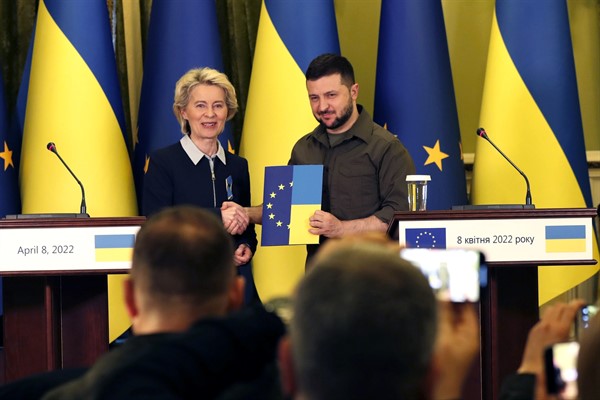The European Union’s 27 leaders have formally approved candidate status for Ukraine and Moldova to join the union, marking the first step toward full EU membership for the two countries. The move has renewed a contentious debate within the EU over expansion, given the longstanding assumption that there would be no movement toward any EU enlargement until at least 2024. “Even a month or so ago the idea that Ukraine might get candidate status seemed quite far-fetched to many,” noted one EU diplomat.
EU members from the bloc’s east have pushed for Ukraine’s candidate status to be expedited since Russian troops invaded the country in February. But Western European capitals, where the subject of EU enlargement has been met with lukewarm enthusiasm over the past decade, have been much less receptive to EU membership for Ukraine. Some members, like France and the Netherlands, have concerns about macroeconomic stability, corruption and rule of law issues in Ukraine, similar to those they expressed about EU members from the bloc’s east that were admitted in the 2000s. They have long wanted to slow down accession in the Western Balkans, for instance, believing that while the future of these countries—as well as Moldova—lies in the EU as full-fledged members, they had not demonstrated the institutional compatibility with the EU’s political and economic standards, and thus accession should be put off until they had successfully completed the necessary reforms. EU enlargement was considered such a long shot that shortly after taking office in 2019, European Commission President Ursula von der Leyen was said to have given the enlargement portfolio to the EU commissioner from Hungary, Oliver Varhelyi, as a kind of retaliation against Hungarian Prime Minister Viktor Orban’s obstructionism—the implicit assumption being EU enlargement would likely be the least important portfolio during von der Leyen’s five-year term.
But fast forward to June 2022, and everything changed—for Ukraine and for the EU. Ukrainian President Volodymyr Zelensky’s high-profile pressure campaign for “fast-track” EU membership appears to have influenced the calculus in the commission as well as in national capitals. Technically speaking, no such fast-track membership exists, but the commission last week gave its recommendation for EU leaders to approve Ukraine’s candidate status just 109 days after the country submitted its application—an unprecedentedly short timeframe for a process that usually takes several years. The commission has steadfastly denied rumors that EU officials gamed the system by filling out questionnaires that were meant to be answered by Ukrainian officials.

